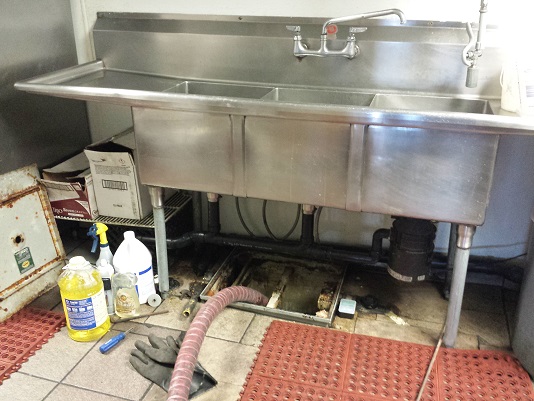Is It Okay to Put a Patio Over a Septic Tank?
Read More
Schedule Online
919-446-4099

Feb 21, 2023
A grease trap is an essential component of any kitchen, helping to prevent grease and other solids from clogging up your plumbing system. However, in order to maintain the efficiency of your grease trap, it's important to clean it on a regular basis.
In this blog post, our professionals from Septic Blue of Raleigh will discuss how often you should clean your grease trap and why it's important to do so. We'll also touch on the relationship between grease traps and septic systems, including septic tank pumping and repair.
Let's start by discussing the operation of grease traps. Grease and other solid waste sink to the bottom of the grease trap when water and waste from your kitchen sink, dishwasher, or other fixtures enter it, while lighter liquids flow out of the trap and into your plumbing system. Solids accumulate over time and may eventually block the trap, leading to backups and other plumbing troubles. So it is important to perform an inspection to make sure that doesn’t happen.
So how frequently should your grease trap be cleaned? The size of your grease trap, the amount of trash your kitchen generates, and local laws all play a part in determining the answer to this question. But generally speaking, the majority of professionals advise cleaning your grease trap at least once every three months.
Cleaning your grease trap more frequently might be necessary if your kitchen is extremely busy. For instance, if you manage a large restaurant that serves hundreds of meals each day, you might need to clean your grease trap more regularly than once every three months. But, if you have a tiny kitchen and produce little waste, you might be able to wait longer between cleanings.
Regular cleanings can aid in preventing foul odors, keeping your kitchen tidy, and preserving the effectiveness of your grease trap. Customers and workers may find the unpleasant odors produced by grease and other substances that build up in your trap and spread throughout your kitchen. Also, the accumulation of solids may serve as a haven for germs and other dangerous microbes, which may result in violations of health codes and other problems.
Let's now discuss the connection between septic systems and grease traps. Keep your grease trap clean and maintained, especially if your kitchen is connected to a septic system. Your septic system can become clogged with grease and other particles, leading to backups and other problems that can be expensive to fix.
Regular septic system pumping is one of the most vital things you can do to keep your septic system safe. Depending on how much trash your septic tank handles and how big it is, most experts advise getting it pumped every three to five years. The removal of sediments and other trash on a regular basis can assist keep your tank from becoming clogged and preventing improper operation.
If your septic system does develop issues, it's critical to deal with them as soon as you can. Ignoring minor problems like backups or poor drainage can eventually lead to more major concerns like system failures that demand expensive repairs or even replacement. It's crucial to get in touch with a professional for septic tank repair as soon as you detect any indications that anything is wrong with your septic system, such as bad odors, slow drainage, or standing water.
Are you experiencing struggles with your septic system? Luckily, we at Septic Blue of Raleigh have professionals ready at your service. Contact our friendly representatives for more questions.